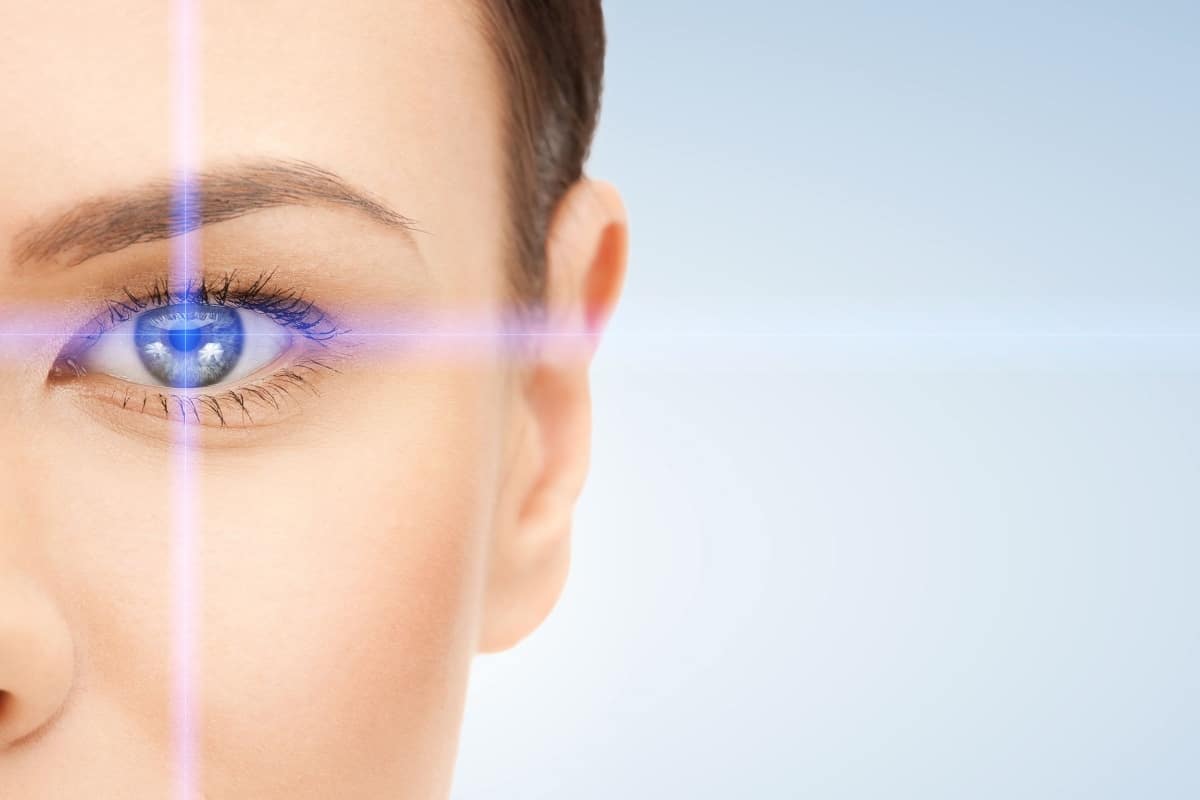Eye exams at Eye Clinic of Austin are administered by our highly experienced optometrist Dr. Melanie Prosise with the assistance of our ophthalmic technicians. Eye Clinic of Austin is committed to the thoroughness of the eye exam to ensure no issues are left undiscovered. To schedule an eye exam, use our Online Scheduler or call us at (512) 427-1100.
Your Health History
Eye Clinic of Austin eye exams consist of several different elements performed in various stages to evaluate the complete visual system. One of the most important parts of the eye exam is discussing and documenting your health history, including personal medical history and family medical history for not only your eyes, but general health as well. If you are a new patient, you can print and fill out new patient forms before coming into the office.
Physical Exam & Eye Chart
After reviewing health history, a physical examination of visual functions will begin. First, Dr. Prosise and our team physically examine the eye and your eyesight is tested by reading an eye chart at various distances. If this test shows that your vision is less than perfect, a refraction will be performed.
Refraction
A refraction is a test to determine each eye’s refractive error. Using a phoropter, a series of lenses in graded powers are presented to determine which provides sharpest, clearest vision. The test is a required separate element of most visits at Eye Clinic of Austin and is used to create prescriptions for glasses and/or contact lenses and/or to evaluate possible changes in vision due to medical conditions. This is essential in order to determine if a decrease in vision is due to only a need for glasses, which is easy to correct, or if another medical reason exists. Dr. Prosise will also test your pupil function, peripheral vision, muscles, and for double vision.
Slit Lamp Exam
Next, a slit lamp examination is performed. The slit lamp is a binocular microscope that the eye doctor uses to examine your eyes under high magnification. During this portion of the exam the eye doctor is able to closely examine your eyelids, whites of your eyes (sclera & conjunctiva), your cornea, pupil, iris and your crystalline lens.
During the slit lamp exam, the optometrist will use some anesthetic eye drops to numb your eyes then using a tonometer will measure the fluid pressure of your eyes to determine if you might have glaucoma. This is painless. The doctor will simply touch your eye with the tonometer probe, which has a smooth plastic surface, for a few seconds.
The back of your eye can also be examined with a very bright light on the slit lamp after your eyes have been dilated or by using the Optomap® Retinal Exam without dilation. Dilating drops are used to enlarge the pupil so that the doctor can get a good view using an ophthalmoscope of the back of your eye to examine and evaluate your retina, blood vessels and optic nerve. The doctor will also use a binocular indirect ophthalmoscope to perform a panoramic view of the entirety of the back of your eye to look for retinal holes, tears, detachments, moles, tumors or abnormal blood vessels.
Corrective Lenses
Once all the tests have concluded, any eye health issues will be discussed with you. At this time the eye doctor can also answer any questions or concerns. We will then determine which corrective lenses would be best to prescribe, whether it’s prescription glasses and/or contact lenses, including the type and brand.
Eye Exam Overview
Comprehensive eye examinations are a key part of maintaining your eye health. Eye exams can serve as preventative care and can also help doctors catch serious eye issues in their early stages when they are easier to treat and before they go on to cause damage to the eyes. It is important for patients to understand that many eye conditions do not show symptoms early on. However, signs of these conditions can be spotted with specialized tests that are administered during comprehensive eye examinations.
Preliminary Checks
Dr. Prosise may opt to observe several aspects of the health and function of the yes before conducting other tests. This may include evaluating your pupils, peripheral vision, and eye movement. Your eye pressure may also be checked with a test known as tonometry. This test can help detect signs of glaucoma, which can jeopardize vision if not treated.
Visual Acuity Tests
Many patients are familiar with the visual acuity test, which evaluates the vision in each eye. This test requires the patient to read the smallest row of letters they can see clearly on a chart at a distance. The patient will also need to cover one eye at a time while reading the letters. Abnormal results from this test may indicate that the patient needs eyeglasses or contact lenses for sharp vision.
Pupil Dilation
Pupil dilation allows our optometrist to observe your retina and optic nerve to detect any signs of damage. It involves special eye drops that widen the pupil. It is normal for eyes to be slightly sensitive to light after the pupils are dilated.
Eye Health for Older Individuals
Individuals aged 65 or older should have eye exams on a frequent basis. This helps doctors identify age-related eye conditions, including cataracts, diabetic retinopathy, age-related macular degeneration, and more.
When Should You See Your Eye Doctor?
Keeping your eyes functional requires being vigilant in recognizing changes in vision or the appearance of the eyes. If you experience any of the following, it is time to come in for a visit:
- Sudden changes in vision
- Trouble seeing colors
- Blurry or distorted vision
- Issues seeing clearly in low-light environments
- Blank spots in vision
- Low central vision
- Eye pain
- Foreign body sensation in the eye
- Injury to the eye
What To Expect During Your Appointment
When you visit Eye Clinic of Austin for your eye examination, you will be welcomed by a friendly and professional staff. During your appointment, you will have the chance to discuss your medical history, including any changes. Dr. Prosise will also inquire about your family history, as this can help her determine if you are at risk of developing certain eye issues that tend to run in families. You will also have the chance to voice any concerns or changes regarding your eyes and vision. If you need glasses or contact lenses, you will be given a prescription. Generally, you should have a complete eye examination every one to two years, but a more frequent schedule may be necessary over time as you age or if you currently have a progressive eye condition or are at risk of developing certain eye diseases.
Testimonials
Eye Care Blog

Ensuring the health and well-being of our eyes demands careful attention and proactive measures. Among the most critical actions we can take is the use of sunglasses to shield our eyes from the sun’s damaging UV rays. This simple yet effective strategy plays a pivotal role in preventing potential harm and preserving our eye health […]

Prevent Eye Injuries This Spring with Protective Eyewear Spring welcomes warmer weather and longer days, enticing many to indulge in outdoor activities. However, this season also poses potential risks for eye injuries. Understanding the significance of protective eyewear is crucial for those with sensitive eyes. At Eye Clinic of Austin, our team is committed […]

In an evolving healthcare landscape, in-office surgery has become an appealing alternative to traditional hospital-based procedures, particularly for patients seeking quality eye care and various eye surgeries, such as corneal transplants or treatment for glaucoma. At Eye Clinic of Austin, our skilled eye doctors address concerns that are related to a range of eye conditions […]






